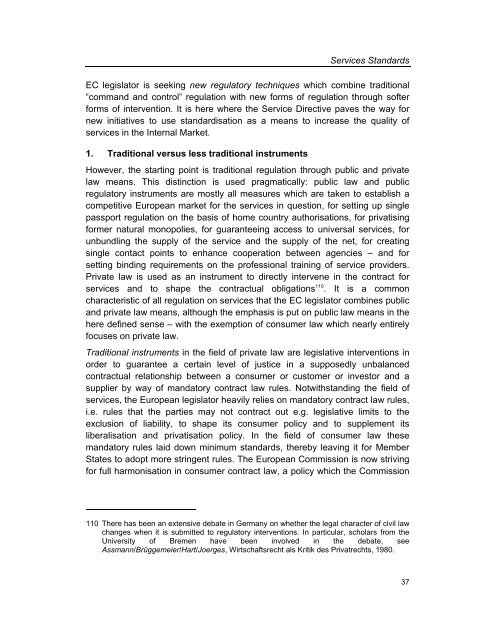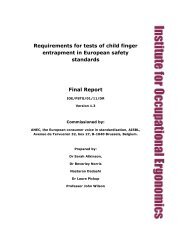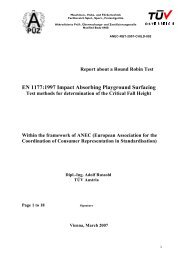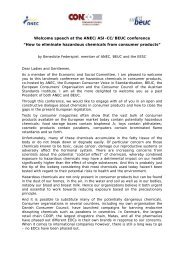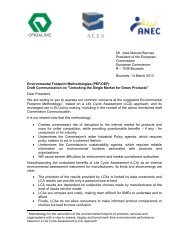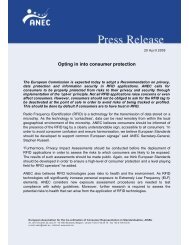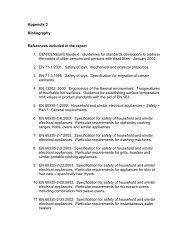Services Standards: Defining the Core Consumer Elements ... - ANEC
Services Standards: Defining the Core Consumer Elements ... - ANEC
Services Standards: Defining the Core Consumer Elements ... - ANEC
You also want an ePaper? Increase the reach of your titles
YUMPU automatically turns print PDFs into web optimized ePapers that Google loves.
<strong>Services</strong> <strong>Standards</strong><br />
EC legislator is seeking new regulatory techniques which combine traditional<br />
“command and control” regulation with new forms of regulation through softer<br />
forms of intervention. It is here where <strong>the</strong> Service Directive paves <strong>the</strong> way for<br />
new initiatives to use standardisation as a means to increase <strong>the</strong> quality of<br />
services in <strong>the</strong> Internal Market.<br />
1. Traditional versus less traditional instruments<br />
However, <strong>the</strong> starting point is traditional regulation through public and private<br />
law means. This distinction is used pragmatically: public law and public<br />
regulatory instruments are mostly all measures which are taken to establish a<br />
competitive European market for <strong>the</strong> services in question, for setting up single<br />
passport regulation on <strong>the</strong> basis of home country authorisations, for privatising<br />
former natural monopolies, for guaranteeing access to universal services, for<br />
unbundling <strong>the</strong> supply of <strong>the</strong> service and <strong>the</strong> supply of <strong>the</strong> net, for creating<br />
single contact points to enhance cooperation between agencies – and for<br />
setting binding requirements on <strong>the</strong> professional training of service providers.<br />
Private law is used as an instrument to directly intervene in <strong>the</strong> contract for<br />
services and to shape <strong>the</strong> contractual obligations 110 . It is a common<br />
characteristic of all regulation on services that <strong>the</strong> EC legislator combines public<br />
and private law means, although <strong>the</strong> emphasis is put on public law means in <strong>the</strong><br />
here defined sense – with <strong>the</strong> exemption of consumer law which nearly entirely<br />
focuses on private law.<br />
Traditional instruments in <strong>the</strong> field of private law are legislative interventions in<br />
order to guarantee a certain level of justice in a supposedly unbalanced<br />
contractual relationship between a consumer or customer or investor and a<br />
supplier by way of mandatory contract law rules. Notwithstanding <strong>the</strong> field of<br />
services, <strong>the</strong> European legislator heavily relies on mandatory contract law rules,<br />
i.e. rules that <strong>the</strong> parties may not contract out e.g. legislative limits to <strong>the</strong><br />
exclusion of liability, to shape its consumer policy and to supplement its<br />
liberalisation and privatisation policy. In <strong>the</strong> field of consumer law <strong>the</strong>se<br />
mandatory rules laid down minimum standards, <strong>the</strong>reby leaving it for Member<br />
States to adopt more stringent rules. The European Commission is now striving<br />
for full harmonisation in consumer contract law, a policy which <strong>the</strong> Commission<br />
110 There has been an extensive debate in Germany on whe<strong>the</strong>r <strong>the</strong> legal character of civil law<br />
changes when it is submitted to regulatory interventions. In particular, scholars from <strong>the</strong><br />
University of Bremen have been involved in <strong>the</strong> debate, see<br />
Assmann/Brüggemeier/Hart/Joerges, Wirtschaftsrecht als Kritik des Privatrechts, 1980.<br />
37


